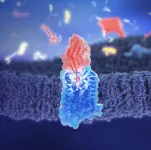(Press-News.org) Wednesday, October 9, 2024, Cleveland: A history of COVID-19 can double the risk of heart attack, stroke or death according to new research led by Cleveland Clinic and the University of Southern California.
The study found that people with any type of COVID-19 infection were twice as likely to have a major cardiac event, such as heart attack, stroke or even death, for up to three years after diagnosis. The risk was significantly higher for patients hospitalized for COVID-19 and more of a determinant than a previous history of heart disease.
Further genetic analysis also revealed individuals with a blood type other an O (such as A, B or AB) were twice as likely to experience an adverse cardiovascular event after COVID-19 than those with an O-blood type.
Published in Arteriosclerosis, Thrombosis, and Vascular Biology, the researchers used UK Biobank data from 10,005 people who had COVID-19 and 217,730 people who did not get infected between February to December 2020.
“Worldwide over a billion people have already experienced COVID-19. The findings reported are not a small effect in a small subgroup,” said co-senior study author Stanley Hazen, M.D., Ph.D., chair of Cardiovascular and Metabolic Sciences in Cleveland Clinic’s Lerner Research Institute and co-section head of Preventive Cardiology. “The results included nearly a quarter million people and point to a finding of global healthcare importance that promises to translate into a rise in cardiovascular disease globally.”
Certain genetic variants are already linked to coronary artery disease, heart attack and COVID-19 infection. The researchers completed a genetic analysis to see if any of these known genetic variants contribute to elevated coronary artery disease risk after COVID-19. None of the known genetic variants were drivers of the enhanced cardiovascular events observed post COVID-19. Instead, the data highlighted an association between elevated risk and blood type.
Previous research has shown that people who have A, B or AB blood types were also more susceptible to contracting COVID-19.
“These findings reveal while it’s an upper respiratory tract infection, COVID-19 has a variety of health implications and underscores that we should consider history of prior COVID-19 infection when formulating cardiovascular disease preventive plans and goals,” said Dr. Hazen.
“The association uncovered by our research indicates a potential interaction between the virus and the piece of our genetic code that determines blood type and signals the need for further investigation,” said Dr. Hazen. “A better understanding of what COVID-19 does at the molecular level may potentially teach us about pathways linked to cardiovascular disease risk.”
Hooman Allayee, PhD, of USC’s Keck School of Medicine, was co-senior author of the paper.
"Our data suggesting that risk of heart attacks and strokes was especially higher among COVID-19 patients with A, B, or AB blood types has significant clinical implications,” Dr. Allayee said.
“Given our collective observations and that 60% of the world's population have these non-O blood types, our study raises important questions about whether more aggressive cardiovascular risk reduction efforts should be considered, possibly by taking into consideration an individual's genetic makeup."
The findings show that the long-term risk associated with COVID-19 “continues to pose a significant public health burden” and that further investigation is needed, according to the authors.
This work was supported by the National Institutes of Health [R01HL148110, R01HL168493, U54HL170326, P30ES007048, R01DK132735, P01HL147823 and R01HL147883].
Disclosures: Dr. Hazen is named as co-inventor on pending and issued patents held by Cleveland Clinic in relation to cardiovascular diagnostics and therapeutics.
END
History of COVID-19 doubles long-term risk of heart attack, stroke and death
Research analysis reveals risk of cardiac events also varied by blood type and stays elevated for years after diagnosis
2024-10-09
ELSE PRESS RELEASES FROM THIS DATE:
Tiny antibodies to fight the dangerous effects of opioids
2024-10-09
Opioid drugs are highly effective at relieving pain but come with severe drawbacks. Their side effects range from dizziness to potentially fatal respiratory depression. Their illegal use contributes to nearly half a million deaths worldwide each year. Researchers from the University of Geneva (UNIGE) have discovered a molecule, called nanobody NbE, which binds tightly and durably to the cell receptors that usually bind to opioids, thereby blocking the drugs’ activity. Moreover, the scientists were able to create even smaller molecules that retain the same properties, which could prove far more effective than current treatments in ...
Researchers discover how plants produce a novel anti-stress molecule
2024-10-09
New research identifies for the first time the genes that help plants grow under stressful conditions - with implications for producing more sustainable food crops in the face of global climate change.
Led by the University of East Anglia (UEA), the study reveals the genes that enable plants to make a novel anti-stress molecule called dimethylsulfoniopropionate, or DMSP. It shows that most plants make DMSP, but that high-level DMSP production allows plants to grow at the coast, for example in salty conditions.
The research also shows that plants can be grown under other ...
You get your energy from your mom. A new study explains why
2024-10-09
It’s one of the basic tenets of biology: We get our DNA from our mom and our dad.
But one notable exception has perplexed scientists for decades: Most animals, including humans, inherit the DNA inside their mitochondria —the cell’s energy centers – from their mothers alone, with all traces of their father’s mitochondrial genome destroyed the moment sperm joins egg.
A new University of Colorado Boulder study published Oct. 4 in the journal Science Advances sheds new light on why this happens, showing that when the process fails, and paternal mitochondria slips into a developing embryo, it can lead to lasting neurological, behavioral and reproductive ...
Our food system is broken and we only have 60 harvests left, researchers warn
2024-10-09
Plant-based diets, compassionate agriculture, Indigenous methods, consumer pressure, new laws, international agreements and even vegan pets – these are the solutions for fixing our broken food and farming systems, say dozens of environmental advocates, researchers, farmers and industry pioneers in a new book.
Editors Joyce D’Silva and Carol McKenna sound the alarm in their introduction to Regenerative Farming and Sustainable Diets, warning that ‘our food system is broken’. Radical change is needed, they say, in our world where one‑third of food is lost or wasted, 780 million people ...
Viruses are teeming on your toothbrush, showerhead
2024-10-09
Step aside tropical rainforests and coral reefs — the latest hotspot to offer awe-inspiring biodiversity lies no further than your bathroom.
In a new Northwestern University-led study, microbiologists found that showerheads and toothbrushes are teeming with an extremely diverse collection of viruses — most of which have never been seen before.
Although this might sound ominous, the good news is these viruses don’t target people. They target bacteria.
The microorganisms collected in the study are bacteriophage, or “phage,” a type of virus that infects and replicates inside of bacteria. Although researchers know little about them, phage recently ...
Can weight-loss surgery help prevent pancreatic cancer in people with obesity?
2024-10-09
Obesity and type 2 diabetes are risk factors for various malignancies, including pancreatic cancer, which has a high death rate. A new analysis in Diabetes/Metabolism Research and Reviews suggests that weight-loss surgery—also called metabolic-bariatric surgery—may lower the risk of developing pancreatic cancer in people with obesity, especially in those who also have type 2 diabetes.
In the systematic review and meta-analysis, investigators identified 12 relevant studies that explored the effects of metabolic-bariatric surgery on pancreatic cancer incidence, with a total of 3,711,243 adults ...
Octopus-inspired adhesive works well in wet conditions
2024-10-09
In research published in Advanced Science, investigators drew inspiration from the octopus to develop an adhesive that achieves strong attachment and controlled release on varied substrates in wet and underwater environments. The feat could have numerous applications in fields ranging from healthcare and underwater robotics to infrastructure repair.
By studying the octopus’s suckers—specifically, the exposed disc-like portion called the infundibulum—the researchers designed an elastic, curved stalk with a membrane that can change its shape ...
Can adrenaline auto-injectors prevent fatal anaphylaxis?
2024-10-09
Individuals at risk of anaphylaxis—an acute systemic hypersensitivity reaction to an allergen or trigger, typically associated with skin reactions, nausea/vomiting, difficulty breathing, and shock—are often prescribed adrenaline (epinephrine) autoinjectors such as EpiPens. A recent review published in Clinical & Experimental Allergy finds that these autoinjectors, which people use to self-administer adrenaline into the muscle, can deliver high doses of adrenaline into the blood, but these levels are short-lived and may not be sufficient to save lives in cases of fatal anaphylaxis.
Investigators noted that data from animal and human studies ...
Insects from the bodies of illegally hunted rhinoceros may provide valuable forensic information
2024-10-09
New research in Medical and Veterinary Entomology reveals that when rhinoceros are found dead after being illegally killed by poachers, analyzing insects on the decomposing body aids in estimating the time since death. This information has been used by investigators and officials to construct cases against suspected perpetrators.
The study included 19 rhinoceros that were illegally killed and dehorned in the Republic of South Africa between 2014 and 2021. Scientists collected 74 samples of insect evidence from these rhinoceros remains, ...
Does outdoor play help protect toddlers against later childhood obesity?
2024-10-09
New research published in Acta Paediatrica suggests that children who engage in outdoor play during their preschool years have a lower risk of developing obesity later in childhood.
The study included children born in Japan during two weeks in January and July 2001. Of 53,575 children born, 42,812 had data on outdoor play habits at age 2.5 years. In a survey, parents were asked, “Where do your children usually play (excluding home residences and daycare centers attended)?” Available options for answers included “in my garden or on the grounds of my apartment complex,” “in parks,” “in natural areas such as ...
LAST 30 PRESS RELEASES:
$3 million NIH grant funds national study of Medicare Advantage’s benefit expansion into social supports
Amplified Sciences achieves CAP accreditation for cutting-edge diagnostic lab
Fred Hutch announces 12 recipients of the annual Harold M. Weintraub Graduate Student Award
Native forest litter helps rebuild soil life in post-mining landscapes
Mountain soils in arid regions may emit more greenhouse gas as climate shifts, new study finds
Pairing biochar with other soil amendments could unlock stronger gains in soil health
Why do we get a skip in our step when we’re happy? Thank dopamine
UC Irvine scientists uncover cellular mechanism behind muscle repair
Platform to map living brain noninvasively takes next big step
Stress-testing the Cascadia Subduction Zone reveals variability that could impact how earthquakes spread
We may be underestimating the true carbon cost of northern wildfires
Blood test predicts which bladder cancer patients may safely skip surgery
Kennesaw State's Vijay Anand honored as National Academy of Inventors Senior Member
Recovery from whaling reveals the role of age in Humpback reproduction
Can the canny tick help prevent disease like MS and cancer?
Newcomer children show lower rates of emergency department use for non‑urgent conditions, study finds
Cognitive and neuropsychiatric function in former American football players
From trash to climate tech: rubber gloves find new life as carbon capturers materials
A step towards needed treatments for hantaviruses in new molecular map
Boys are more motivated, while girls are more compassionate?
Study identifies opposing roles for IL6 and IL6R in long-term mortality
AI accurately spots medical disorder from privacy-conscious hand images
Transient Pauli blocking for broadband ultrafast optical switching
Political polarization can spur CO2 emissions, stymie climate action
Researchers develop new strategy for improving inverted perovskite solar cells
Yes! The role of YAP and CTGF as potential therapeutic targets for preventing severe liver disease
Pancreatic cancer may begin hiding from the immune system earlier than we thought
Robotic wing inspired by nature delivers leap in underwater stability
A clinical reveals that aniridia causes a progressive loss of corneal sensitivity
Fossil amber reveals the secret lives of Cretaceous ants
[Press-News.org] History of COVID-19 doubles long-term risk of heart attack, stroke and deathResearch analysis reveals risk of cardiac events also varied by blood type and stays elevated for years after diagnosis


